Remembering Yaakov Just on Israel’s Memorial Day
By MOSHE GIT
From the inception of the State of Israel, the custom has been to dedicate the day prior to Israel’s Independence Day (Yom Ha’atzmaut) to the memory of the fallen soldiers, without whose sacrifice the state would not exist or endure. That day is known as Yom Hazikaron (Memorial Day.)
The instantaneous and harsh transition from the somber Yom Hazikaron to the celebrations of Yom Ha’atzmaut is painful for many, especially for the families of the deceased soldiers. But the custom remains.
Commemorating Yom Hazikaron
The name of one fallen soldier, “Just” (pronounced YOOST), has been fixed in my mind since childhood, and this article is dedicated to his memory.
 Yaacov Just
Yaacov Just
Frankly, I don’t know why I remember that name. I neither knew the person nor his family. When the hostilities broke out, I was five years old. We were living at the southern edge of Tel Aviv, close to the Arab town of Jaffa, and had to be concerned about being sniped at. My mother took me along on her daily shopping excursions for food. She always chose a path that was shielded from view by trees, to the extent possible. Nevertheless, I remember one day, on our way to the grocery store she used to patronize, a bullet landed on the ground about five feet from us. I picked it up.
On our way we passed another grocery store. For some reason, unknown to me, my mother never shopped there. But once, while passing that store on the way to “her” store, she blurted: This store had belonged to the Justs, but they sold it when their son was killed in the war. She added that since then, they hadn’t been able to continue with life as usual. His death had shattered them.
My mother never mentioned this again, and I don’t know why that story and the name, Just, got imprinted in my mind. When I visited that neighborhood decades later, there was no longer a grocery store there, but, in my head, the name Just emerged again. I wondered if that word meant anything to the store’s present tenants.
This year, about a month ago, I decided to use our computer, to find out who the soldier, whose last name was Just, was.
With the clues that I had, the task wasn’t difficult. I found out that the son’s name was Yaakov, that he was born in Jaslo, Poland, in 1930, to his parents David and Miriam, and that his family immigrated to Palestine when he was three years old. It appears that he had no siblings. He was educated at the same elementary school in Tel Aviv that I later attended. Thus, both of us had occupied the same building for eight years (at that time elementary school education lasted eight years) and, most likely, a few of his teachers were also mine. That facility was the first religious Zionist school in Israel, and Yaakov became ardently both religious and Zionist. Also, he was an avid collector of stamps (as was I).
After graduation he joined the Haganah, the largest Jewish underground military organization, and took signal classes to help with the military effort. When he was 16, he enthusiastically helped with building new settlements (at that time this wasn’t controversial). When the British authorities executed a number of Jewish fighters, including the famous Dov Gruner, he wrote a cutting condemnation of them in his personal journal. He vowed that we wouldn’t let Majdanek be repeated.
(Majdanek was a death camp in Poland, about 150 miles north of his childhood home. I imagine many of his relatives perished there, as did many of my relatives. Interestingly, it was the one camp my family and I chose to visit a few years ago).
He opposed the United Nations partition plan for Palestine, including the internationalization of Jerusalem, and added that those who are engaged in the building of their homeland aren’t afraid of death. He said: “We, members of the young generation who never experienced slavery, cannot be imprisoned by anyone in a ghetto. We will fight relentlessly until our demands are met.”
He was killed on February 13, 1948 (3 Adar aleph, 5708, on the Hebrew calendar), in a military operation on the Tel Aviv-Jaffa border, not far from where my parents and I were living at that time and from where his parents’ grocery store was.
Yaakov’s mother died at the age of 104, in 2007, clutching his picture in her hands.
***
Moshe Git lives in Minnetonka.
(American Jewish World, 4.27.12)









 Yaacov Just
Yaacov Just









